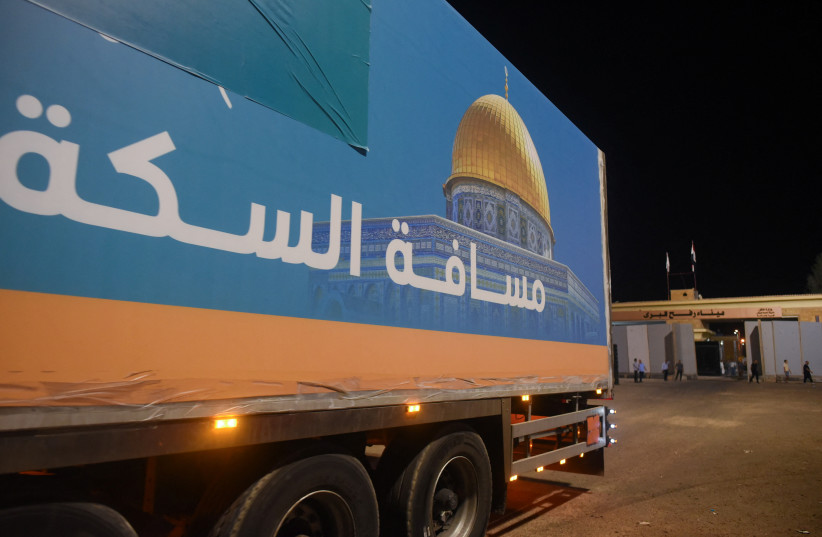Aid continues to flow to Gaza to enable the civilian population of Gaza to receive their needs. Israel’s war in Gaza is not with Gazans but with the terrorist group Hamas. However, Hamas has often exploited its control over Gaza to hijack aid and utilize it for its own needs. While some of the aid that reaches Gaza may also be reaching the hostages that Hamas is holding, it is essential that Hamas not be able to exploit the suffering in Gaza to regain power in the enclave.
Israel’s Coordination of Government Activities in the Territories (COGAT), facilitating humanitarian aid for Gaza, recently said that the 10,000th aid truck was transferred to Gaza.
“Since the start of the war, close to 99% of coordinated trucks were approved for entry,” COGAT said. A total of around 260 trucks are crossing into Gaza each day. This is the highest number since the Hamas attack on October 7.

COGAT has said that “there is no limit to the amount of humanitarian aid that can enter the Gaza Strip.” However, there are also concerns that while this aid is flowing into Gaza, Israel is not seeing the desired results in terms of hostages getting the medicine and other requirements they need. A balance must be struck so that humanitarian assistance to Gaza is closely monitored and Hamas cannot continue to exploit it. Videos showing Hamas gunmen on aid trucks are concerning. All of the aid should be monitored once it reaches Gaza to make sure it gets to the right people.
The problem with the border region
Towards that end, Israel also faces a difficult choice in its next steps in Gaza. The area along the border with Egypt is sensitive because Egypt has concerns about any Israeli military operation that would close off Gaza’s crossing with Egypt. This area is called the Philadelphi Corridor, and Israel operated here two decades ago to prevent smuggling and terrorist activity. Hamas has long sought to use the border region to stockpile and move weapons. While Egypt has sought to block this smuggling, Hamas still operates in Rafah and in areas along the border.
This border corridor ties into Hamas’s continued presence in Gaza and the issue of aid into Gaza. The aid enters via this border area, where many civilians and displaced people are living after fleeing fighting in northern Gaza and Khan Yunis.
It is essential now that Israel create a policy for what comes next in Gaza. Hamas has its own plan for the day after. It wants to regain control of areas in Gaza slowly. For instance, Hamas will want to infiltrate the civilian areas in northern Gaza, where an estimated 250,000 people have remained despite the fighting. Hamas will also want to continue to control Rafah and the border. This is essential if Hamas is to continue its terrorist activities.
Cutting off Hamas from these areas will weaken it. However, to do that requires that Israel will operate in more areas where Hamas will hide behind civilians. The critical question for Israeli leaders now is to put forth a policy that will defeat Hamas and reduce its control over the last areas in which it still has power.
Rafah is the next major challenge. This will require sensitive discussions with Egypt and other regional and global powers. Israel should embark on this now and sketch out a plan for what comes next so that Hamas cannot get a head start on the day after in Gaza and once again manipulate the region and the world into staying in power.
Our future depends on the next steps that Israel takes in Gaza. Hamas is trying to exploit this phase to exploit humanitarian aid to Gazans and to recuperate from its losses.
